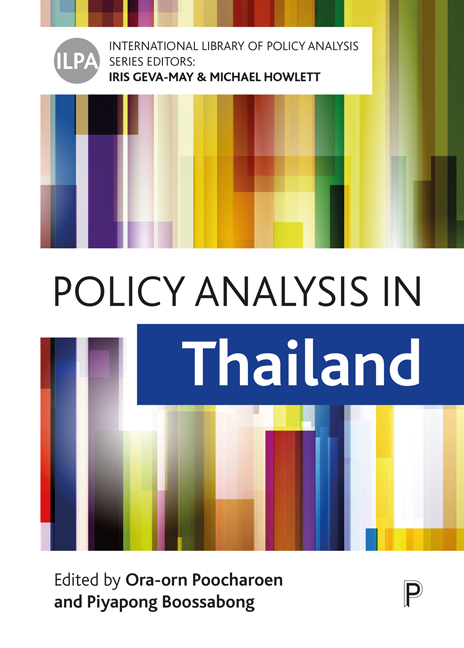Book contents
- Frontmatter
- Contents
- List of figures and tables
- List of abbreviations
- Notes on contributors
- Editors’ introduction to the series
- Introduction
- Part One History, styles and methods of policy analysis in Thailand
- Part Two Policy analysis within executive government
- Part Three Policy analysis beyond executive government
- Part Four Political parties and interest groups in policy analysis
- Part Five Policy analysis education and research
- Index
eleven - Political parties and policy analysis
Published online by Cambridge University Press: 20 January 2024
- Frontmatter
- Contents
- List of figures and tables
- List of abbreviations
- Notes on contributors
- Editors’ introduction to the series
- Introduction
- Part One History, styles and methods of policy analysis in Thailand
- Part Two Policy analysis within executive government
- Part Three Policy analysis beyond executive government
- Part Four Political parties and interest groups in policy analysis
- Part Five Policy analysis education and research
- Index
Summary
Introduction
Political parties in Thailand have paid most attention to choosing political leaders and mobilising resources for both local and national elections. With that, serious professional policy analysis has been ignored by most political parties. The basic tool that has been used is ‘polling’, to check the popularity of their party, politicians and policies, and thus, in turn, ‘populist policy’ has become the policy culture of political parties in the country (Yeema, 2004; Ear-apisitpong and Samakkeetham, 2012; Dumrongrat, 2020). To aim for winning the election, comparative policy analysis can be seen as the main approach for most parties. They usually compare policy choices of their competitors and propose the better one, especially with the international reference (Issarachai, 2012; Phoojiwat, 2021). In the national election in 2019, it can be observed that there was a new political party, supported by the younger generation, that attempted to engage with the more critical orientations of policy analysis by challenging short-term populist policies and proposing some policies based on public deliberation and reinterpretation of the Thai society towards the structural transformation.
For a better understanding of the change in policy analysis in political parties, we need to understand first the changing political landscape in Thailand. After the coup d’etat in 2014, activities related to political parties in Thailand were halted. For almost five years, there were no elections in Thailand, and in positions that were supposed to be elected, such as the mayor of Pattaya, the government chose to appoint their allies instead. When the then-military junta government declared an upcoming election in 2019, political parties in Thailand started to emerge once again.
Prior to 24 March 2019, the national election date, the government changed the date several times, declaring that Thailand was not yet ready for an election (The Guardian, 2019). Not only was the uncertainty of the election date troublesome to political parties, but rules for establishing political parties were tightly regulated. According to the 2017 Constitution's Organic Act on Political Parties enacted in late 2017, to be able to establish a political party, the potential political party needs to be founded with at least 500 Thai citizens and its initial capital needs to be one million Thai baht, estimated at approximately US$31,000 (Organic Act on Political Parties, 2560 BE [2017 CE]). Seemingly
- Type
- Chapter
- Information
- Policy Analysis in Thailand , pp. 203 - 218Publisher: Bristol University PressPrint publication year: 2023



